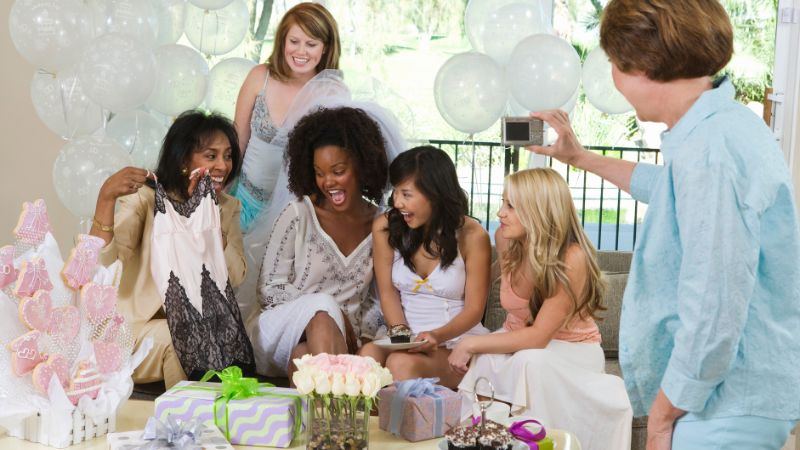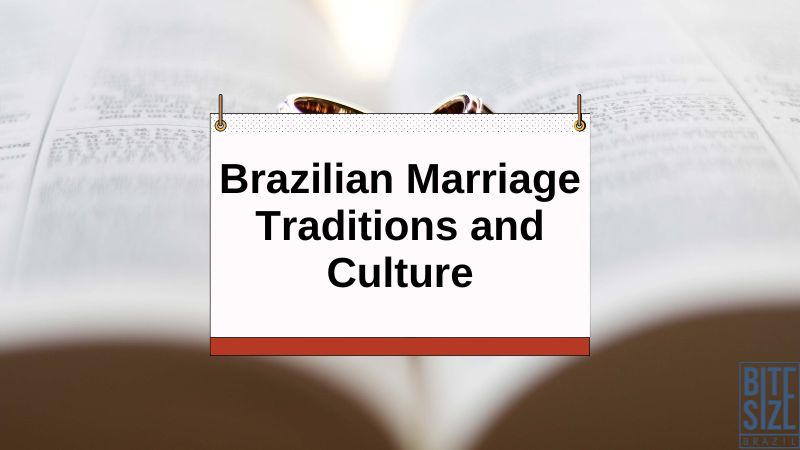The number of divorces in Brazil in 2022 has gone down 10% in comparison to 2021, according to recent research.*
I guess now that couples can move away from each other, they can work their marriage out and make it last longer.
But that's not the primary purpose of this discussion. If you're here, you want to know more about marriage in Brazilian culture.
That's what it says in the title.
And although I'm not for marriage the way it happens in Brazil — usually resulting in massive debt for all parties involved — I'm always intrigued by our traditions. So...
In this article, we will delve deeper into the meaning and importance of marriage in Brazilian culture.
We will explore the traditions, customs, and rituals that make Brazilian weddings unique. And you'll come away knowing one thing or two about marriages in Brazil that not everyone knows.
Marriage in Brazilian Culture… an overview
Traditionally, marriage in Brazilian culture is not just a union of two people — once you're married to someone, you get the whole package [in Portuguese]: all the -in-laws become effective family members.
One could say it's a happy thing. And, most of the time, it is.
As for the wedding ceremony...
The Brazilian wedding ceremony is a unique blend of traditional and modern elements that vary depending on the region and the couple's religion.
However, some common customs are followed across the country.
For instance, it is customary for the bride to wear a white dress and the groom to wear a suit.
The ceremony is usually held in a church or a chapel, followed by a reception that is a feast of delicious food, drinks, and music.
The importance of marriage in Brazilian culture can be traced back to the country's colonial past.
With the native people, marriage was a way to consolidate alliances between different tribes (something discussed in the excellent book História da Riqueza no Brasil – affiliate link – unfortunately with no English edition).
The Portuguese brought with them the Catholic faith, which became the dominant religion in Brazil. The Catholic Church places great emphasis on the sacrament of marriage, which has influenced how Brazilians view marriage. It is seen as a sacred union blessed by God and meant to last a lifetime. This is reflected in the traditional vows that the couple takes during the ceremony.
Now, marriages are officialized through a wedding ceremony, and we can divide the wedding into three distinct phases:
Before, during, and after the ceremony, each with their own set of traditions.
Pre-Wedding Traditions
One of Brazil's most popular pre-wedding traditions is the "chá de panela [in PT]," (“pan tea”) similar to a bridal shower.
The bride's friends and family gather to celebrate her upcoming wedding by bringing gifts for her new home.

The tradition is believed to have originated from the idea of helping the bride set up her new home with the essentials.
The main rules?
It's a girls-only event.
And if you're invited, you bring the gift (usually from a list the bride sent), and you get to eat.
The event is filled with laughter, games, and delicious food. It is a time for the bride to bond with her female loved ones and celebrate her upcoming nuptials.
Despedida de solteiro
Another pre-wedding tradition in Brazil is the "despedida de solteiro," which is equivalent to a bachelor or bachelorette party.
This tradition allows the bride and groom to spend a fun-filled night with their friends before their big day.
The party can range from an evening of dancing and drinking to a more adventurous outing like a camping trip or a day at the beach.
This tradition is a fun way for the couple to let loose and enjoy themselves before the wedding.
The Brazilian Wedding Ceremony, the Big Day
The wedding ceremony usually happens in a church, and if the soon-to-beweds are smart, they have booked this church at least six months in advance.
That happens because churches that will hold wedding ceremonies are in great demand — even in times of financial slumps and crises.
I remember one friend who married in one of the most in-demand of churches of Salvador.
Because it's a historic church, there was much more to see other than the bride and the groom. It was an unforgettable experience for the guests.
And for my friend, it was unforgettable too because it set her back in about $10,000… Just for the rental.
And mind you, at the time, the yearly salary of a minimum-wage worker was $2400 in today's money (2023).
But putting financial considerations aside, the wedding ceremony in Brazil is the big day.
The ceremony begins with the entrance of the bride and groom, who are typically accompanied by their parents. The couple exchanges vows and rings, symbolizing their commitment to each other. The use of flowers, especially white lilies and roses, is also significant in Brazilian weddings. These flowers represent purity, innocence, and love and are often used in the bride's bouquet and throughout the ceremony.
After the whole shebang is over, the bride throws the bouquet so the women attending the ceremony can grapple with and elbow each other for it.
It is believed that whoever catches the bouquet is the next one to marry.
One of the most significant aspects of a Brazilian wedding is the "padrinho" and "madrinha." These are the couple's godparents.
Traditionally they are chosen for their wisdom, guidance, and support. But nowadays, we tend to choose those people we deem as our best friends — and that makes sense.
Post-Wedding Traditions
The wedding may be over, but the celebrations and traditions in Brazilian culture continue long after the couple has exchanged vows.
These post-wedding traditions are as important as the wedding ceremony and involve the newlyweds, their families, and friends.
One of the first post-wedding customs observed by Brazilian couples is the tradition known as "bem-casados."
Translating to "well-married," this custom involves distributing sweets that resemble mini wedding cakes to all the guests as a token of appreciation.

These treats, made from sponge cake and filled with dulce de leche (you can grab the recipe here), are typically wrapped in beautifully decorated paper. The act of giving bem-casados is seen as a gesture of good luck, and whoever receives one should make a wish before biting the cake.
The newlyweds also partake in a unique custom known as "cortar a gravata," or "cutting the tie." In my experience, this tradition is waning. Not many people want to cut an expensive tie they didn't buy but rented.
Anyway, during the wedding reception, the groom's tie is cut into small pieces and sold to guests to raise money for the couple's honeymoon or their new life together.
Not everybody likes this tradition, though. The thinking that goes behind the discomfort people feel is, "I came to this wedding to eat and celebrate, not to spend money."
Of course, people usually express that more eloquently than the blunt way I put it. But you get the idea.
It's worth noting that the diversity of Brazil, with its multitude of ethnic backgrounds and regional variations, means that post-wedding customs can vary widely.
Some traditions reflect a blend of indigenous, Portuguese, and African influences, while others might include practices unique to immigrant communities.
Brazilian Marriage Laws and Legalities
Although marriage in Brazil tends to be celebrated in churches — even for some people who are not religious — that alone doesn't make it official.
We usually divide marriage into two categories:
- Casar de papel passado, or casar no civil: the legal union of two people.
- Casar no religioso: the religious or spiritual union of two people.
The legal union can happen either before or after the religious marriage. And sometimes, people decide not to have a religious marriage but rather a small reception for their closest friends.
This saves them money and the hassles of finding a place to hold the ceremony.
What if I'm not Brazilian but want to marry a Brazilian in Brazil?
If you're a foreigner looking to marry in Brazil, there are several steps you need to follow. Be aware that while the process is generally the same across the country, there may be slight regional differences. Here are the main steps:
Gather the Necessary Documents:
As a foreigner, you need several documents to get married in Brazil. These typically include:
- A valid passport
- A birth certificate (original or certified copy)
- A statement of marital status, often obtained from your home country's embassy or consulate in Brazil, stating that you are legally free to marry.
- If applicable, a divorce decree or death certificate if you have been married previously
All non-Portuguese documents need to be translated by a sworn translator in Brazil and authenticated by the Brazilian Foreign Office.
To find a sworn translator, check with the relevant Commercial Association by state.
Civil Registry Office (Cartório):
In Brazil, all marriages must be performed at a Civil Registry Office, or "Cartório." You should visit the Cartório in your or your partner’s district.
Submit all the required documents to the Cartório. There, you'll complete a "Declaration of Intent to Marry" form (also called "habilitação de casamento") and pay a fee.
For more information, please visit the government page on the topic (only in Portuguese).
Waiting Period:
Once you've submitted all your documents, there's a waiting period. The notice of your intent to marry will be posted at the Cartório for about 15 days. This allows any objections to the marriage to be raised. If there are no objections, you can proceed.
Marriage Dynamics in Modern Brazilian Culture
Marriage in Brazilian culture has changed significantly over the years, reflecting the country's dynamic society.
Brazilian couples have embraced various wedding styles from traditional religious ceremonies to modern beach weddings to celebrate their love.
The wedding festivities can range from a grand spectacle with hundreds of guests to an intimate affair with only the closest family and friends in attendance.
"União Estável" is a legal term in Brazil that translates to "Stable Union" in English. It is a form of civil union recognized by Brazilian law, and it offers many of the same rights and responsibilities as a formal marriage.
In modern Brazilian culture, marriage has taken on a new meaning. While it is still considered a sacred institution, many couples choose to live together before tying the knot. This shift in attitudes towards cohabitation has led to an increase in the number of civil unions, which offer legal recognition to couples who choose not to marry in a religious or traditional ceremony.
Despite these changes, the family remains at the heart of Brazilian culture, and marriage is still seen as a significant milestone in a person's life. It is a time for couples to show their commitment to each other and for families to come together to celebrate this joyous occasion. Recently, there has been a growing trend towards destination weddings, with couples opting to exchange vows in exotic locations like the beaches of Rio de Janeiro or the Amazon rainforest.
And that's it!
Marriage in Brazil is basically the same as in many countries, but the Brazilian touch: the jeitinho we have 🙂
Got questions or personal insights about marriage in Brazilian culture? Drop a comment below!
Sources:

